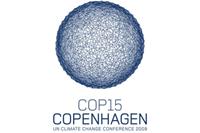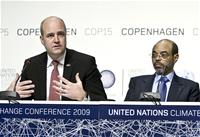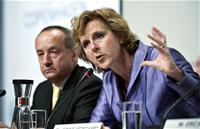Tension at Copenhagen is rising
Adelina Marini, December 17, 2009
 China cannot envision reaching an immediate, operational accord out of the negotiations here, according to an official involved in the talks, an official from the Chinese delegation said, quoted by the Washington post. It remains unclear what China would be willing to embrace instead of a robust political agreement, as previously announced. This happened literally hours before president Barack Obama to arrive in the Danish capital.
China cannot envision reaching an immediate, operational accord out of the negotiations here, according to an official involved in the talks, an official from the Chinese delegation said, quoted by the Washington post. It remains unclear what China would be willing to embrace instead of a robust political agreement, as previously announced. This happened literally hours before president Barack Obama to arrive in the Danish capital.
Yesterday's negotiations were heartbreaking. Initially there was a beam of hope for a breakthrough between rich and poor states after the US and Japan agreed to make major contributions to the developing world to keep prospects of a deal alive. The leader of the African nations also announced that the African Union is keen on accepting a smaller -- though still sizable -- package of financial aid, in return for going along with an agreement. The prime minister of Ethiopia, who represents the Union, Meles Zenawi proposed a new mechanism in which rich countries would provide money to poor ones to help deal with the effects of climate change.
He said Africa would accept $30 billion a year in the short term, rising to $100 billion a year by  2020, for poor countries worldwide. In autumn the EU proposed 100 bn euro as a sufficient amount if aid to help developing countries meet the impact of climate change, although poor countries denounced it as too small.
2020, for poor countries worldwide. In autumn the EU proposed 100 bn euro as a sufficient amount if aid to help developing countries meet the impact of climate change, although poor countries denounced it as too small.
Also yesterday the delegation of Japan announced it would provide $15 billion over the next three years. The United States has yet to say how much money, if any, it will offer to poor countries for this purpose. So far, Washington has showed willingness to pay $1 billion in funding aimed at helping developing countries preserve their forests.
Another reason for serious differences in the negotiations was the currently active Kyoto Protocol. The problem is that poor and developing countries want it to serve as a basis for the new agreement while most developed countries - the EU, Japan, Australia, Russia and Canada want to scrap the 1997 Kyoto Protocol, because the United States and China did not join in its pledges to cut emissions, and start with a new document. For the Financial Times experts on climate change also differed with regard to the Kyoto Protocol.
Robert Stavins, a professor from Harvard said that the main problem with keeping the spirit of the Kyoto Protocol is the distinction between countries. In Annex I of the Protocol are included all developed countries who have legally binding commitments to cut their emissions while in the second Annex are most of the countries - developing and poor who are not legally obliged to do anything. According to Mr. Stavins the world had changed dramatically since 1997 when the Protocol was signed and now more than 50 countries outside Annex I have greater per capita income than the poorest of the Annex I countries. For example Mexico and South Korea joined the OECD just six months after Kyoto. This organisation welcomes only rich and developed countries.
Besides, the professor from Harvard says, developing countries now produce much more greenhouse gases. Vivienne Cox, a chairman of Climate Change Capital added that the countries that produce most carbon dioxide should do most to solve the problem. The distinction between "developed" and "developing", she said, had become more and more blur and would not lead to a reasonable solution.
One of the architects of the Kyoto Protocol Graciela Chichilnisky says though that the structure of the Protocol is necessary because without it key elements, that have been negotiated in 1997 will be missed. Those elements took 8 years to be ratified and turn into international law in 2005. Jeremy Leggett, an ambassador to the Global Observatory at Copenhagen, directly blamed the US by saying that developing countries are completely justified in insisting that developed countries keep to the legally-binding language. "One state may have a sizeable a problem with some of its senators, and its ultraconservative climate-denying heartland but it should not and cannot be an excuse for a mass retreat", he added.
 On Wednesday in the Danish capital one more serious problem occurred. The recent chairman of the Climate Change Conference, organised by the UN - the Danish environment and climate minister Connie Hedegaard stepped back from the chairmanship and gave it to the prime minister of Denmark Lars Lokke Rasmussen. This caused discontent among the hundreds of participants at the summit because the change came unexpectedly, Last night Connie Hedegaard told the BBC that there was not chaos at the conference and that the change was planned. But many of the key participants said, again for the BBC, that they did not know about the change.
On Wednesday in the Danish capital one more serious problem occurred. The recent chairman of the Climate Change Conference, organised by the UN - the Danish environment and climate minister Connie Hedegaard stepped back from the chairmanship and gave it to the prime minister of Denmark Lars Lokke Rasmussen. This caused discontent among the hundreds of participants at the summit because the change came unexpectedly, Last night Connie Hedegaard told the BBC that there was not chaos at the conference and that the change was planned. But many of the key participants said, again for the BBC, that they did not know about the change.
This situation unleashed a lot of speculations about the reasons for Ms. Hedegaard's stepping down. She is the newly designated European Commissioner for climate change who, after hearings in the European Parliament, will officially take her duties in the end of January. According to fellow-journalists at the conference, the reason for her stepping down is that if there is a failure at the conference someone will have to take the responsibility and the Danish hosts have decided that it would be better Connie Hedegaard to take it. However, it is also possible the truth to be exactly vice versa - given her strong performance at the conference and her forthcoming role as a Climate change Commissioner, the Danish premier, under the pressure of the Commission, to have decided to keep her safe from a probable failure so that she could take over her field in January without the label "the failed climate deal of the century".
Today in Copenhagen will continue to arrive heads of state and government from around the world. It is also expected the Bulgarian prime minister Boyko Borisov also to attend the summit on Friday. Initially our country was supposed to be represented by the minister of environment and waters Ms. Nona Karadzhova, but on Monday during the visit of the first Eu president Herman van Rompuy in Sofia it became clear that the premier will attend the final phase of the climate negotiations.
 | © White House press service
| © White House press service | © COP15
| © COP15 | © COP15
| © COP15